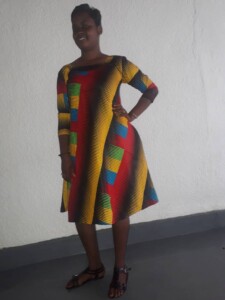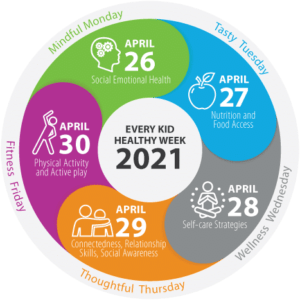Every Kid Healthy in Rwanda: Mentoring girls to thrive in healthy relationships
By Maddison Hall, MPH, WI-HER Program Officer
Question: Thank you so much for sharing your experience today. To celebrate Every Kid Healthy Week, WI-HER is focusing on the ways we can support the health and wellbeing of adolescent girls and young women. To begin, can you introduce yourself, and tell us why you were inspired to work with girls and young women in your community in Rwanda?

Answer: My name is Clementine Tumwambaze, I am Rwandan, and I am a volunteer mentor with the Young Women’s Christian Association (YWCA) working with girls and young women in my community. I became a mentor because I am a young woman myself, and I wanted to help other people in my community, especially adolescent girls and young women in my village. I wanted to volunteer with girls and young women because I am passionate about helping other people in my community.
Q: As a mentor, how do you support the girls and women in your community to stay healthy?
A: I visit with girls in my community who need additional support when they face different problems, like accessing food, going to the health facility, or paying school fees. I am someone that girls can talk to, and I can give them hope and advice, especially girls who are orphans and do not live with their parents. There are many adolescent girls in my village who have had early pregnancies, who drop out of school, lose support from their family, and face many challenges. These girls can come to me in a “Safe Space” to get care, have conversation with their peers, and get advice, and they are able to feel better about themselves. For example, we have “sugar daddies” [typically, older men who offer money or gifts like cell phones in exchange for sex with younger girls] and I help girls make decisions to stay away from these situations so they can stay healthy and stay in school.

Q: One of the themes of Every Kid Healthy Week is promoting connectedness, relationship skills, and social awareness to cultivate mental health and social and emotional wellbeing. Why do you think this is important to girls’ health?
A: Relationships and positive connections are important for girls, because there is great value in friendships and relationships with family. It helps reduce the rate of anxiety and depression, and it can even help them to recover from physical illnesses. With strong, healthy relationships, they have more trust and cooperation in their lives and can help them to be more successful in their lives. I work with girls to help them have positive relationships in my community by giving them advice and guidance. For example, I work with many students who go to school. There was one student who I worked with, and her parents were living with HIV. Another child in her school, whose parents were not living with HIV, had a conflict with her because of her parents’ HIV status. I brought them together in the “Safe Space,” and I supported them to resolve their conflict and bring understanding to each other.
Q: What kind of relationship skills can help girls and young women protect their health?
A: For adolescent girls who are above 15 years old, the more mature adolescents, these girls don’t have enough information to protect their sexual health in romantic relationships. There are girls who have boyfriends or husbands and who engage in sexual intercourse, but they don’t know how to use a condom. I give them a full package of information to know how to use a condom and avoid early or unwanted pregnancies and sexually transmitted infections (STIs). I also help them practice how to negotiate with their boyfriends or husbands to use a condom. I like helping girls have the information they need.
Q: What do you think makes you most successful in helping girls and young women stay healthy?
The first thing is to build trust with them. I’m telling adolescents how to care for themselves – how to use a condom, how to take HIV treatment, how to take PrEP (pre-exposure prophylaxis for HIV prevention) – and they have to trust me. The second is communication. When I go to visit girls, I bring them the truth, and I visit them in person and call them. I give my number to girls so they can call me when they need support or advice, and I give them the phone number for other resources too.
Clementine Tumwambaze is a DREAMS (Determined, Resilient, Empowered, AIDS-free, Mentored and Safe) Mentor with YWCA in Kickurio District in Rwanda.
The interview has been edited for length and clarity.